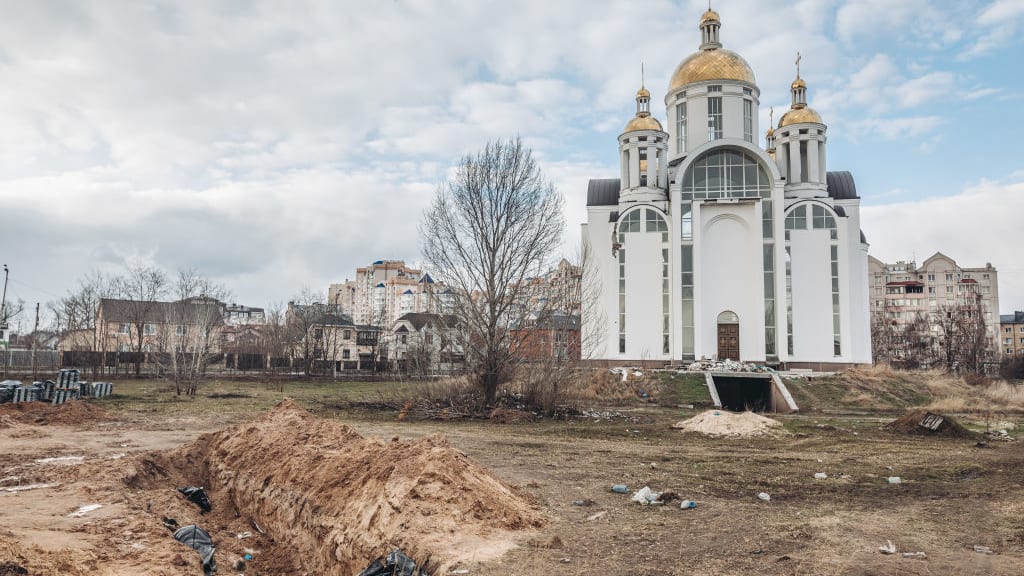Ukraine's foreign minister: Mass killings in Bucha 'the tip of the iceberg'


A free daily email with the biggest news stories of the day – and the best features from TheWeek.com
You are now subscribed
Your newsletter sign-up was successful
Images out of Bucha, Ukraine, showing streets lined with the dead bodies of civilians have stunned the world, and Ukrainian Foreign Minister Dmytro Kuleba said on Monday this is just the "tip of the iceberg."
Ukrainian troops discovered the bodies in Bucha, a suburb of Kyiv, over the weekend, after Russian troops pulled back from the city. While Russia's Ministry of Defense claimed the bodies were "a hoax" and placed in the streets after the withdrawal, satellite imagery shows that many of the bodies were there more than three weeks ago, when Russia occupied the city, The New York Times reports.
Ukrainian President Volodymyr Zelensky traveled to Bucha on Monday, and said he wanted the press to show "the world what happened here. What the Russian military did. What the Russian Federation did in peaceful Ukraine. It was important for you to see that these were civilians." He accused Russia of committing "genocide" and "war crimes," and said there were bodies "found in barrels, basements, strangled, tortured."
The Week
Escape your echo chamber. Get the facts behind the news, plus analysis from multiple perspectives.

Sign up for The Week's Free Newsletters
From our morning news briefing to a weekly Good News Newsletter, get the best of The Week delivered directly to your inbox.
From our morning news briefing to a weekly Good News Newsletter, get the best of The Week delivered directly to your inbox.
Late Monday, Zelensky said Ukrainian officials have "information" indicating mass killings took place in other Kyiv suburbs, including Borodyanka, about 15 miles west of Bucha. Borodyanka is no longer under Russian control, and Ukraine's prosecutor general, Iryna Venediktova, said the carnage there is higher than elsewhere. "In terms of human casualties, the worst situation is in Borodyanka," she said, according to the Kyiv Independent. "There's a lot to process."
Earlier Monday, Kuleba spoke in Warsaw about the situation in Mariupol, the port city that has been surrounded by Russian troops for weeks. Residents there continue to live without electricity, clean water, or enough food and medicine, and local officials say the constant shelling by Russian forces has killed so many civilians that they have been forced to bury them in mass graves.
"I can tell you without exaggeration but with great sorrow that the situation in Mariupol is much worse compared to what we've seen in Bucha and other towns and villages nearby Kyiv," Kuleba said. He demanded world leaders impose the "most severe sanctions this week" against Russia, adding, "this is the plea of the victims of the rapes and killings. If you have doubts about sanctions, go to Bucha first."
A free daily email with the biggest news stories of the day – and the best features from TheWeek.com
Catherine Garcia has worked as a senior writer at The Week since 2014. Her writing and reporting have appeared in Entertainment Weekly, The New York Times, Wirecutter, NBC News and "The Book of Jezebel," among others. She's a graduate of the University of Redlands and the Columbia University Graduate School of Journalism.
-
 ‘Poor time management isn’t just an inconvenience’
‘Poor time management isn’t just an inconvenience’Instant Opinion Opinion, comment and editorials of the day
-
 Bad Bunny’s Super Bowl: A win for unity
Bad Bunny’s Super Bowl: A win for unityFeature The global superstar's halftime show was a celebration for everyone to enjoy
-
 Book reviews: ‘Bonfire of the Murdochs’ and ‘The Typewriter and the Guillotine’
Book reviews: ‘Bonfire of the Murdochs’ and ‘The Typewriter and the Guillotine’Feature New insights into the Murdoch family’s turmoil and a renowned journalist’s time in pre-World War II Paris
-
 What is ‘Arctic Sentry’ and will it deter Russia and China?
What is ‘Arctic Sentry’ and will it deter Russia and China?Today’s Big Question Nato considers joint operation and intelligence sharing in Arctic region, in face of Trump’s threats to seize Greenland for ‘protection’
-
 What would a UK deployment to Ukraine look like?
What would a UK deployment to Ukraine look like?Today's Big Question Security agreement commits British and French forces in event of ceasefire
-
 Would Europe defend Greenland from US aggression?
Would Europe defend Greenland from US aggression?Today’s Big Question ‘Mildness’ of EU pushback against Trump provocation ‘illustrates the bind Europe finds itself in’
-
 Did Trump just end the US-Europe alliance?
Did Trump just end the US-Europe alliance?Today's Big Question New US national security policy drops ‘grenade’ on Europe and should serve as ‘the mother of all wake-up calls’
-
 Is conscription the answer to Europe’s security woes?
Is conscription the answer to Europe’s security woes?Today's Big Question How best to boost troop numbers to deal with Russian threat is ‘prompting fierce and soul-searching debates’
-
 Trump peace deal: an offer Zelenskyy can’t refuse?
Trump peace deal: an offer Zelenskyy can’t refuse?Today’s Big Question ‘Unpalatable’ US plan may strengthen embattled Ukrainian president at home
-
 Vladimir Putin’s ‘nuclear tsunami’ missile
Vladimir Putin’s ‘nuclear tsunami’ missileThe Explainer Russian president has boasted that there is no way to intercept the new weapon
-
 The Baltic ‘bog belt’ plan to protect Europe from Russia
The Baltic ‘bog belt’ plan to protect Europe from RussiaUnder the Radar Reviving lost wetland on Nato’s eastern flank would fuse ‘two European priorities that increasingly compete for attention and funding: defence and climate’
